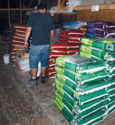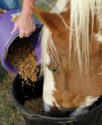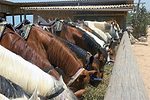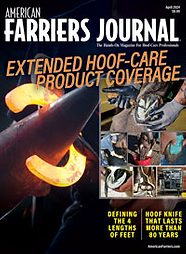Advertise Follow Us
Karen Briggs
As an equine nutritionist, Karen Briggs researched, designed and marketed a line of premium quality feeds for performance, pleasure and breeding horses. She’s also offered nutritional and ration balancing information to horse owners throughout Ontario.
Located in Puslinch, Ontario, the award-winning equine writer is also a Canadian Equestrian Federal certified-riding instructor and has managed several Canadian farms and riding schools.
ARTICLES
Nutrient Strategies
Equine nutritional needs change when the temperature drops. Here’s what your footcare clients need to know to weather winter successfully
Read More
Nutrient Strategies
How to Read the Feed Label
You may need to read between the lines on that feed label to correctly interpret the nutritional value of a feed for your hoof-care customers
Read More
Nutrient Strategies
What’s Best? Pellets, Nuggets, Rolled Or Flaked Rations?
There are pros and cons to every available grain format. Let’s weigh the options
Read More
Nutrient Strategies
Horses & H2O
Your clients may not think of water as a nutrient, but it’s the most essential dietary ingredient of all
Read More
Nutrient Strategies
Those Amazing Minerals
While they may not make up a very big portion of the daily diet, minerals play a key nutrition role and contribute significantly to horse health
Read More
Nutrient Solutions
Those Vital Vitamins
Vitamins have the power to promote and regulate virtually all of the body’s normal functions
Read More
Nutrient Strategies
The Real Low-Down on Fats
Here’s plenty of ammunition to help answer concerns from hoof-care clients concerning the fat supplementation controversy
Read More
Nutrient Strategies
Protein: What It Is, What It Isn’t
Let’s clear up some of the misunderstandings about the role of protein in the equine diet
Read More
Nutrient Strategies
Dealing With Carbohydrates, Energy and Other Nutritional Mysteries
Given the opportunity and good health, the horses you work with will choose to consume enough feed to meet their energy needs
Read More
Nutrient Strategies
Focusing on Forage
A diet based on forage means a happy, healthy equine digestive tract in the horses that you trim and shoe
Read More
Top Articles
Current Issue
American Farriers Journal
American Farriers Journal is the “hands-on” magazine for professional farriers, equine veterinarians and horse care product and service buyers.
A Cost-Effective Way to Fight Equine Hoof Diseases
What are the 4 Lengths of Horses’ Feet?
Does New Labor Rule Alter Your Multi-Farrier Practice?
Current Issue
Special Report For Equine Veterinarians
American Farriers Journal is the “hands-on” magazine for professional farriers, equine veterinarians and horse care product and service buyers.
Must Read Free Eguides
Download these helpful knowledge building tools
- Caring for Your Horse During a Pandemic
- CBD Products Have Promise for Farriers, but Buyer Beware
- Sharpening Knives with a Buffer
- Winter Hoof Care
Videos
Farrier Education: Heartland Horseshoeing School
Farriery requires knowledge and skills to provide proper equine hoof care. In this series, sponsored by VICTORY, American Farriers Journal visits Heartland Horseshoeing School in Lamar, Mo. In this edition, Chris Gregory discussed his journey to becoming an educator, his focus in teaching farrier students and the state of farrier education.
Events
EMS (IR) and PPID: Diagnosis and Management (Part 1) Webinar
Date: 02/26/24
Location:
View Event
Top Directory Listings
Life Data Labs Inc
Life Data Labs Inc. is a dedicated product manufacturer committed to producing premium quality animal nutrition and health products through continuous product improvement and new product development. First-class ingredients, fresh products, consistent high quality and scientifically proven effectiveness are the principal features of Life Data Labs animal health products. And that's why they've produced the #1 recommended hoof supplement by farriers for 12 consecutive years.
Kawell USA
Kawell develops and produces copper alloy horseshoes and inserts, giving horses the care that they need to fight issues associated with white line disease, seedy toe and thrush.
SmartPak
From the feed room to the tack room, SmartPak offers innovative solutions to help riders take great care of their horses. SmartPak was founded in 1999 with the introduction of the patented SmartPak™ supplement feeding system. The revolutionary, daily dose SmartPaks are custom-made for your horse, individually labeled and sealed for freshness.













